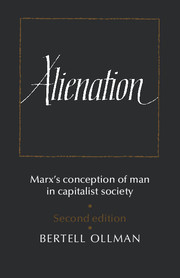Book contents
- Frontmatter
- Contents
- Preface to the second edition
- Note on translations
- Acknowledgements
- General introduction
- PART I PHILOSOPHICAL INTRODUCTION
- 1 With words that appear like bats
- 2 Social relations as subject matter
- 3 The philosophy of internal relations
- 4 Is there a Marxian ethic?
- 5 Dialectic as outlook
- 6 Dialectic as inquiry and exposition
- PART II MARX'S CONCEPTION OF HUMAN NATURE
- PART III THE THEORY OF ALIENATION
- PART IV CONCLUSION
- Appendix I In defense of the philosophy of internal relations
- Appendix II Response to my critics: more on internal relations
- Notes to the text
- Bibliography of works cited
- Index of names and ideas
- Cambridge Studies in the History and Theory of Politics
3 - The philosophy of internal relations
Published online by Cambridge University Press: 05 June 2012
- Frontmatter
- Contents
- Preface to the second edition
- Note on translations
- Acknowledgements
- General introduction
- PART I PHILOSOPHICAL INTRODUCTION
- 1 With words that appear like bats
- 2 Social relations as subject matter
- 3 The philosophy of internal relations
- 4 Is there a Marxian ethic?
- 5 Dialectic as outlook
- 6 Dialectic as inquiry and exposition
- PART II MARX'S CONCEPTION OF HUMAN NATURE
- PART III THE THEORY OF ALIENATION
- PART IV CONCLUSION
- Appendix I In defense of the philosophy of internal relations
- Appendix II Response to my critics: more on internal relations
- Notes to the text
- Bibliography of works cited
- Index of names and ideas
- Cambridge Studies in the History and Theory of Politics
Summary
Marx's scholarly concern was with capitalism, and in studying this society he naturally operated with social Relations, his vocabulary reflecting the real social ties which he uncovered. What remains to be explained, however, is how Marx could conceive of social factors as Relations where physical objects are involved. For in his discussions, machines, the real articles produced, the worker's person, etc., are all components of one social Relation or another. We learn, for example, that ‘capital is, among other things, also an instrument of production, also past personal labor’. According to the definition given earlier, every such component is itself a Relation. It follows from this that Marx conceives of things as Relations. Unless this conclusion can be defended, the interpretation I have offered of social Relations will have to be drastically altered. By drawing together the relevant evidence and tracing the history of the broad philosophical position that underlies Marx's practise, I shall try in this chapter to provide such a defense.
Most modern thinkers would maintain that there cannot be relations without things just as there cannot be things without relations. Things, according to this ‘common sense’ view, constitute the basic terms of each relation and cannot themselves be reduced to relations. However, this objection only applies to Marx if what he is doing is caricatured as trying to reduce the terms of a relation to that which is said to stand between them.
- Type
- Chapter
- Information
- AlienationMarx's Conception of Man in a Capitalist Society, pp. 26 - 40Publisher: Cambridge University PressPrint publication year: 1977

